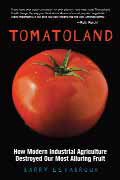SEJournal Online is the digital news magazine of the Society of Environmental Journalists. Learn more about SEJournal Online, including submission, subscription and advertising information.

BookShelf
Tomatoland: How Modern Industrial Agriculture Destroyed Our Most Alluring Fruit
By Barry Estabrook
Andrews McMeel, $19.99
Reviewed by JENNIFER WEEKS
Journalist Barry Estabrook opens Tomatoland with a startling vignette: He’s driving on I-75 toward Naples, Fla., when spheres that look like green baseballs start flying off of a truck in front of him. At a stoplight, he sees the green orbs littering the roadside are tomatoes — mostly identical, and not one smashed, even after flying off a truck at 60 mph.
That’s an arresting image, especially for a food writer (Estabrook was a contributing editor at Gourmet and founding editor of Eating Well).
In Tomatoland, Estabrook explains why the tomato industry is concentrated in Florida, where the weather is too wet and sandy soil doesn’t contain enough nutrients for the plants to flourish. The answer has “everything to do with marketing and nothing to do with biology,” he wrote. Florida is warm when the East and Midwest are cold, and winter tomatoes can be trucked north to market in a day or two. Growers in Florida have a three-part strategy: raising tomatoes green (so they will survive shipping), cheaply and off-season. Flavor doesn’t enter the equation.
This book is mainly an exposé of the negative impacts of producing tomatoes this way.
Florida producers use huge quantities of pesticides, herbicides and fertilizers to ward off pests and help tomatoes grow in Florida’s unpromising conditions. Those tomatoes are harvested by slave labor — mostly Hispanic men who come to South Florida for farm jobs, but then are charged so much for rent (in filthy shacks and box trucks), food and liquor that they can never afford to leave. A U.S. attorney based in Fort Myers told Estabrook the agricultural city of Immokalee is “ground zero for modern-day slavery.”
Estabrook spent several chapters on the harrowing lives of tomato pickers, many whom are underpaid, denied benefits or exposed to toxic agricultural chemicals daily. He also talked to leaders of industry organizations such as the Florida Tomato Committee, which sees itself as a beleaguered industry trying to make a profit in a low-margin business and compete with growers in Mexico and greenhouses in Canada.
It took more than a decade for labor organizers to convince the industry to raise wages and adopt a Fair Food Code of Conduct late in 2010. Both sides called the agreement one to make the Florida tomato industry “a model of social accountability for the 21st century.”
From that success Estabrook pivots back to his original question: Why won’t modern agribusiness deliver a decent-tasting tomato? Researchers are breeding and cross-breeding types that have good flavor and are hardy enough to transport, but that’s just the first step. Then they need seed companies that will mass-produce and distribute the plants, and retailers who will carry the new products. Other players are important too, such as public-interest lawyers who represent field workers, and a developer who builds clean, affordable housing for migrants.
Another hopeful character, Tim Stark, grows vine-ripened tomatoes on a farm in eastern Pennsylvania and sells them to upscale Manhattan restaurants and at New York City’s Greenmarket. Stark farms almost completely without pesticides and fertilizers (although he is not certified organic), pays workers a living wage, and knows his regular customers by name.
“He embraces the fruit’s intrinsic ‘tomato-ness’ and, in so doing, has built a business that allows his employees to buy cars, purchase homes, and send children to private high schools back in Mexico,” Estabrook wrote.
It’s hard work and takes a heroic amount of energy and stubbornness. “But for me, for now, it seems like the right thing to do,” Stark says.
It’s heartening to see that growing tomatoes the right way can succeed, at least in some places.
Tomatoland is full of startling facts about large-scale agribusiness and how it has commercialized and manipulated tomatoes. It also shows why everyone — not just foodies — should want them to be better.
Jennifer Weeks is a Boston-based freelancer and a member of SEJ's board of directors.
* From the quarterly newsletter SEJournal, Winter 2011-12. Each new issue of SEJournal is available to members and subscribers only; find subscription information here or learn how to join SEJ. Past issues are archived for the public here.













 Advertisement
Advertisement 



